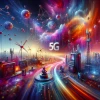
As we stand on the brink of a new era in connectivity, the advent of 5G technology promises to revolutionize the way we interact with the world. With faster speeds, lower latency, and the ability to connect more devices than ever before, 5G is set to transform industries and daily life alike. However, with these advancements come challenges that must be navigated with care. Join us as we delve into the intricate world of 5G technology, exploring its benefits and the hurdles it presents.
The Promise of Speed and Efficiency
5G technology is not just an incremental upgrade from its predecessor, 4G. It’s a quantum leap forward. Imagine downloading a full-length HD movie in seconds or streaming a live concert with no lag. This is the promise of 5G. The technology can achieve speeds up to 100 times faster than 4G, thanks to its use of higher frequency bands and advanced antenna technology. This speed is not just a luxury; it’s a necessity in our increasingly digital world. For businesses, this means more efficient operations and the ability to harness the power of real-time data. The healthcare sector, for example, can benefit immensely from 5G, enabling remote surgeries with precision tools that require minimal latency.
The Challenge of Infrastructure
With great speed comes the need for robust infrastructure. 5G networks require a denser network of small cells compared to 4G, which means more antennas and base stations. This poses a significant logistical and financial challenge, especially in rural or less developed areas where the cost of deploying such infrastructure may not be economically viable. Moreover, the installation of numerous small cells raises concerns about urban aesthetics and potential health impacts, although studies have yet to conclusively prove any adverse effects.
Security Concerns in a Hyper-Connected World
While 5G opens doors to unprecedented connectivity, it also widens the attack surface for cyber threats. The sheer volume of connected devices means more potential entry points for hackers. Ensuring the security of these devices and the data they transmit is paramount. The transition to 5G requires robust encryption methods and a proactive approach to cybersecurity. Businesses and governments must collaborate to establish standards and protocols that safeguard against potential breaches.
Impact on Industries and Innovation
5G is set to be a game-changer across various industries. In manufacturing, it can enable smart factories where machines communicate seamlessly, leading to increased efficiency and reduced downtime. The automotive industry anticipates a future with autonomous vehicles that rely on 5G for real-time data exchange. Even agriculture stands to benefit, with precision farming techniques that utilize 5G to optimize resource use. However, industries must be ready to adapt and invest in new technologies to fully leverage the benefits of 5G.
The Environmental Footprint of 5G
The environmental impact of rolling out 5G technology is another consideration. While the technology itself can facilitate greener solutions, such as smart grids and efficient transportation systems, the production and deployment of 5G infrastructure have their own carbon footprints. The increased energy consumption of a hyper-connected world needs to be balanced with sustainable practices and innovations in energy efficiency.
Navigating Regulatory and Privacy Challenges
The implementation of 5G also involves navigating a complex web of regulatory and privacy issues. Different countries have varying standards and regulations, which can complicate international operations. Additionally, the collection and processing of vast amounts of data raise privacy concerns. It’s crucial for policymakers to create frameworks that protect consumer privacy while still fostering innovation and growth in the digital economy.
Common Misconceptions About 5G
Despite its potential, 5G is often misunderstood. A common misconception is that 5G will immediately replace all existing networks. In reality, 5G will initially complement 4G networks, gradually phasing in as infrastructure develops. Another misunderstanding is the belief that 5G is solely about speed. While speed is a significant benefit, the true power of 5G lies in its ability to support a massive number of connected devices and enable new applications that were previously impossible.































